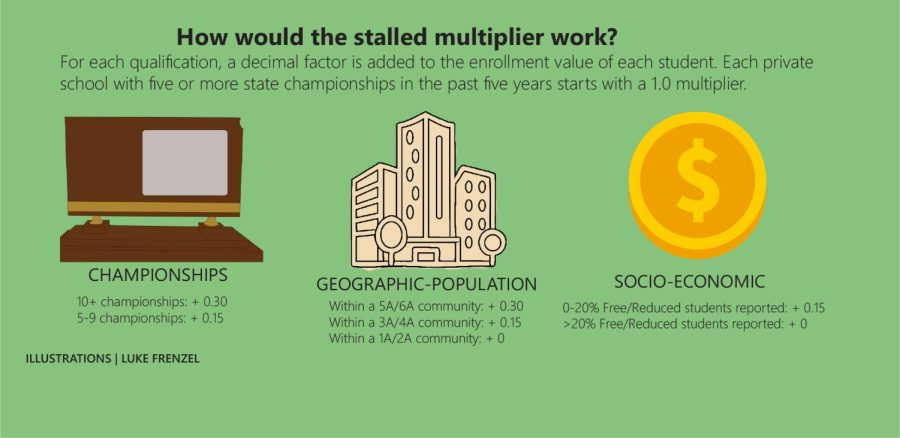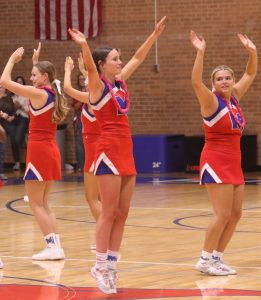Uncertain Switch: KSHSAA to re-evaluate school multiplier bill after stall
In February, bill HB 2003 did not pass out of the chamber, keeping Miege as a 4A school.
March 30, 2023
With a long history of dominating state championships, calls to move from 4A to 5A as a school circulated over the years but never made way to action until this year, though the action has stalled in the Kansas Legislature.
The Kansas State Board of Education in October of 2022 voted 6-4 to send the Kansas State High School Activities Association’s proposed class “multiplier” rule to the state legislature, where a vote was expected during the legislative session that runs from January to May.
But things might have reached a stop at the end of February.
During the week of Feb. 19-25, known as “Turn Around” week, bills must be passed out of the chamber where they were introduced, according to the weekly newsletter of Roeland Park’s senator, Ethan Corson.
Though there can be exceptions, a bill not voted on is considered “dead” for the session. According to the Kansas Legislative bill tracker, bill HB 2003 did not pass out of the chamber, keeping Miege as a 4A school.
“It’s a matter of when or even if they’re going to vote on it,” athletic director Joe Schramp said. “There are some rumors that they are not going to address it because they think that there are more important matters that are going on. It’s pretty frustrating, but I understand that they are busy people.”
Although the proposal likely died in this legislative session, the possibility of it still remains with modifications made to the bill for the next legislative session in January 2024 — meaning future teams could still be impacted.
According to the Kansas City Star, the legislature disliked the open-ended interpretation of the three-word change, which permitted KSHSAA to classify schools by their enrollment and “other means.”
According to head football coach Jon Holmes, for years people have claimed Miege should not be in 4A as the consistent streak of wins has sparked ideas of holding an “upper hand” in most competitions.
“I wouldn’t say Miege is technically involved in the legislative process,” Holmes said. “But our school is the poster child for why the other schools want a multiplier rule. It seems like every article you read and every news story about this is centered around our athletic success, so that’s why it’s kind of interesting.”
Holmes said that he felt the proposal would be good for football, but debate and forensics coach Melissa Reynolds voiced concern for the possible disadvantages that 5A-6A brings for her teams.
“Our style of debate is very different from the 5A and 6A debate in Kansas,” Reynolds said. “A lot of the schools that are really prominent in those areas are involved in a national circuit, so they’re competing outside of Kansas. 5A and 6A have brought that back to Kansas, and that’s become very dominant in the way that they debate in Kansas against other 5A and 6A schools. It would be a huge transition.”
Schramp also debates the fairness of the rule. Bishop Miege voted no on the multiplier rule under the belief that public and private schools should be treated equally.
“We just want it to be fair as there are a lot of public schools out there that win most of their state championships,” Schramp said. “I believe that they should be bumped up as well. We’re being penalized for being a private school.”
But senior Clare McLellan sees the change as hopeful instead of damaging to the school’s success. According to McLellan, users on Twitter have named it the “Miege Rule” so every individual knows how it came to be pushed for in the first place.
“Miege has a long history of athletic excellence and that will continue regardless of what division we compete in,” McLellan said. “I love the history of Miege sports and how many state championships we’ve won, but it makes sense that eventually a multiplier would be enacted.”







